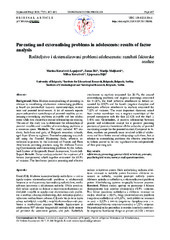Приказ основних података о документу
Parenting and externalising problems in adolescents: results of factor analysis
| dc.creator | Kovacevic-Lepojević, Marina | |
| dc.creator | Ilić, Zoran | |
| dc.creator | Maljković, Marija | |
| dc.creator | Kovacevic, Milica | |
| dc.creator | Ljeposava, Ilijić | |
| dc.date.accessioned | 2024-01-11T10:25:28Z | |
| dc.date.available | 2024-01-11T10:25:28Z | |
| dc.date.issued | 2020 | |
| dc.identifier.issn | 0042-8450 | |
| dc.identifier.issn | eISSN: 2406-0720 | |
| dc.identifier.uri | http://rfasper.fasper.bg.ac.rs/handle/123456789/5371 | |
| dc.description.abstract | Background/Aim. Modern conceptualising of parenting in relation to manifesting adolescence externalising problems is based on parent-child two-way communication, mutual trust and parental involvement. A lot of research reports prove independent contribution of parental variables on expressing externalising problems in middle and late adolescence while data about their mutual relationship are missing. The aim of this study was to determine the relationships of parental variables and variables of externalising problems in a common space. Methods. The study included 507 students, both boys and girls, of Belgrade secondary schools, aged from fifteen to eighteen. Parental monitoring was studied using the Parental Monitoring Scale, affective attachment to parents by the Inventory of Parents and Peers Attachment, parenting practices using the Alabama Parenting Questionnaire and externalising problems by the Achenbach System of Empirically Based Assessment, Youth Self-Report. Results. Factor analysis indicated the existence of 4 factors (components) which together accounted for 65.5% of variance. The first factor (positive parenting and affective attachment to mother) accounted for 38.1%, the second (externalising problems and negative parenting) accounted for 11.26%, the third (affective attachment to father) accounted for 8.93% and the fourth (negative discipline and inadequate affective attachment to mother) accounted for 7.22% of variance. The most important discovery arised from matrix correlation was a negative correlation of the second component with the first (-0.539) and the third (-0.481) one. Conclusion. A positive relationship between parents and adolescents except for a positive parenting practices of parents characterize all the subscales of parental monitoring except for the parental control. Compared to fathers, mothers are generally more involved in life of adolescents and have better mutual relationship with them, but in relation to externalising problems the affective attachment to fathers proved to be very significant even independently of their parenting role. | sr |
| dc.language.iso | en | sr |
| dc.publisher | Vojnomedicinska akademija | sr |
| dc.rights | openAccess | sr |
| dc.rights.uri | https://creativecommons.org/licenses/by-nc-nd/4.0/ | |
| dc.source | Vojnosanitetski pregled | sr |
| dc.subject | adolescent | sr |
| dc.subject | parenting | sr |
| dc.subject | parent-child relations | sr |
| dc.subject | parents | sr |
| dc.subject | psychological tests | sr |
| dc.subject | surveys and questionnaires | sr |
| dc.title | Parenting and externalising problems in adolescents: results of factor analysis | sr |
| dc.type | article | sr |
| dc.rights.license | BY-NC-ND | sr |
| dc.citation.epage | 493 | |
| dc.citation.issue | 5 | |
| dc.citation.rank | M23 | |
| dc.citation.spage | 487 | |
| dc.citation.volume | 77 | |
| dc.identifier.doi | https://doi.org/10.2298/VSP170117099K | |
| dc.identifier.fulltext | http://rfasper.fasper.bg.ac.rs/bitstream/id/10864/0042-84501800099K.pdf | |
| dc.type.version | publishedVersion | sr |


